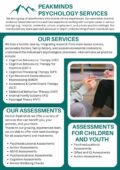
Trauma and PTSD therapists in Vandalia, Ohio OH

Ken Knoechel - Effective Mindset
Licensed Professional Counselor, MS, LPC
Do you feel scared all the time? Do you feel like fear from past experiences controls your what you do and say? PTSD conditions you to always be on the lookout for danger! Even if you’re consciously telling yourself, “HEY NOW, RELAX, THERE IS NOTHING TO FEAR HERE,” your subconscious mind retorts, “Hell no! You need to make sure what happened before doesn’t happen ever again!” I will help you learn to control how you respond physically and emotionally to people, places, and things that trigger escalated emotions. It usually takes me about a month (4 sessions) to bring my clients to places that resolve resilience in their lives. You can expect good things after meeting with me for a while. I hope to see you soon.
Peakminds Psychology
Psychologist
With the ability to utilize a variety of psychological methods and techniques, the clinicians at Peakminds are adept supporting the needs and goals of clients. Peakminds is dedicated to supporting veteran's and their families within their experiences of trauma and PTSD and welcome the opportunity to work with such populations.
Utah Center for Evidence Based Treatment
Psychologist, Ph.D.
The UCEBT Trauma, Stress, and Resilience (TSR) Program provides expert care in the treatment of stress and trauma-related issues.
Most people at some point in their lives will experience a trauma or other difficult event, such as a loss of a loved one, medical illness, financial stressors, work burnout, divorce, etc. Depending upon our unique past and current circumstances, these events impact each of us differently. In the aftermath, some may develop symptoms of posttraumatic stress disorder (PTSD), depression, grief, or experience other life challenges. In spite of our best efforts, sometimes the problems persist and common coping strategies (like isolation, working long hours, alcohol, etc.) can create new problems.
Fortunately, there are now several proven therapies to get people unstuck and tap into our natural human ability to heal after a painful life event. Our center is committed to offering the most effective treatment options for both supporting you during a difficult period as well as long-term skills to foster resiliency for the future.
There are several gold standard evidence-based treatments right now for trauma. Our clinicians in this program have formal training and expertise in:
Acceptance and Commitment Therapy
Cognitive Processing Therapy -- CPT is a therapy that focuses on helping individuals identify and challenge unhelpful thoughts and beliefs related to their traumatic experiences. It aims to promote cognitive restructuring and reduce distressing symptoms. CPT has been recommended as treatment for post-traumatic stress disorder (PTSD) by organizations such as the American Psychological Association (APA) and the U.S. Department of Veterans Affairs (VA/DoD). This episode of This American Life does a great job capturing what to expect in CPT and illustrating its effectiveness: https://www.thisamericanlife.org/682/ten-sessions
Cognitive Behavior Therapy for Insomnia
Trauma-focused Cognitive Behavioral Therapy Interventions -- TF-CBT is a structured therapy that focuses on helping individuals process and cope with traumatic experiences. It combines cognitive-behavioral techniques with trauma-specific interventions. TF-CBT has also been widely recommended as a treatment PTSD by the APA and the VA/DoD.
Eye Movement Desensitization and Reprocessing Therapy (EMDR) -- This modality uses eye movements or other forms of bilateral stimulation to help individuals process traumatic memories and reduce distressing symptoms. In contrast to the "top-down approaches" listed above, this is a "bottom-up approach," meaning that it starts with addressing the physiological and sensory aspects of an individual's experience before moving on to cognitive or higher-order processes. This approach recognizes that trauma can have a profound impact on the nervous system and bodily sensations. The goal is to help individuals process and release traumatic experiences by accessing the body's wisdom and resources. By directly targeting the limbic system (the feeling center of the brain) and sensory receptors throughout the body, a bottom-up approach aims to undo trauma's imprint on the body and promote healing. It acknowledges that trauma responses are not solely cognitive but also involve physiological and sensory aspects.
Prolonged Exposure -- PE is a type of therapy that involves gradually and systematically exposing individuals to trauma-related memories, situations, or objects that they have been avoiding. The goal is to help individuals confront and process their traumatic experiences, reducing avoidance and fear. PE has also been recommended as a treatment for PTSD by the APA and the VA/DoD.
The Gottman Method for Couples Therapy
Written Exposure Therapy (WET) -- Sometimes, flashbacks can be so debilitating and spike our SUDS so suddenly, that all of the above-mentioned modalities end up doing more harm than good. This modality is a brief, trauma-focused talk therapy that involves a series of [typically] five 30- to 45- minute sessions. The therapy involves writing about the thoughts and feelings experienced during the traumatic event, which allows individuals to engage with the memory and potentially overcome shame or embarrassment associated with the experience. The goal is to help individuals find new ways to think about their traumatic experiences and gain relief from PTSD symptoms. There is little 'down time' between sessions, meaning an individual could schedule all five sessions back-to-back and effectively stop flashbacks or other reexperiencing symptoms within a week, which no other modality can match in terms of efficiency.
Dr. Desiree S. Howell
Psychologist, Ph.D.
Using EMDR, IFS-informed, and somatic (body-based) strategies, we will collaboratively explore what you need and want to feel safe to continue on your healing journey. Your body is wise and many habits were likely effective coping strategies in the past but are now no longer serving you. We will work together to help your body recalibrate its sense of safety and enjoy a regulated nervous system.
Dr. Wayne Bullock
Psychologist, PsyD, MEd
As you move through life, you might go through an experience that is overwhelming to you. Trauma is the result of an experience so distressing that it leaves you feeling disconnected from yourself and others. You might feel jumpy, numb, distrusting, and unsure of your future. Sharing and processing with someone who can help you to understand and make sense of the senseless can help you to begin to heal from your trauma.





